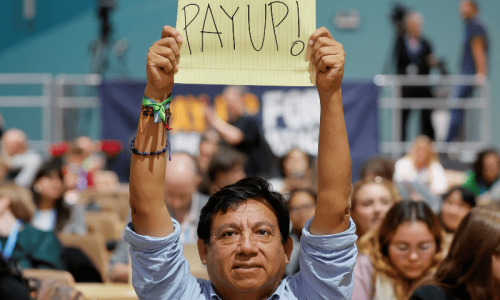THE COP29 climate summit in Baku has stretched past the Friday deadline into overtime, with negotiations still underway at the time of writing. Although the final outcome is not likely to be known for some time, suffice it to say that what started with a bang may end in a whimper.
The central sticking point at the summit was the establishment of a New Collective Quantified Goal for climate finance over which the Global North and Global South continued to remain at an impasse. Developed countries, historically responsible for the bulk of GHG emissions, were expected to commit to a robust financial framework. Instead, they stalled, with their draft proposals offering placeholder numbers and prioritising private financing over public grants.
Reportedly the wealthy nations have agreed to raise the climate finance figure to $300bn, while the developing nations want a bigger contribution. The amount proposed by the former is still in huge contrast to the minimum of $1tr a year needed by 2030 just to meet Paris Agreement goals.
It is particularly concerning given that Pakistan alone faces a climate finance gap of $348bn by 2030. Whatever the outcome, there will likely remain a deep disconnect between climate reality and wealthy nations’ commitments. The fact that developing nations like Sierra Leone were thinking of walking out of the deal speaks volumes for how short-changed they feel.
Besides how much must be paid, the question that emerged was who must pay. European nations insist that high-emitting economies such as China and Gulf states share the burden. However, the Global North cannot deflect responsibility for historical emissions. Meanwhile, the recent election of Donald Trump — who believes climate change is a hoax — as US president, cast a pall over the talks. Some of the wealthy nations believe the world’s biggest economy will want nothing to do with the finance goal during Mr Trump’s tenure.
Pakistan’s delegation, led by negotiator Arif Goheer, aptly criticised the draft agreement as “disappointing”. Our diplomatic efforts at the summit, including hosting over 40 events, demonstrate our commitment to global climate action. Prime Minister Shehbaz Sharif reiterated the pressing need for grants, not loans, to avoid deepening debt traps. Domestically, Pakistan has taken steps to address climate vulnerabilities, unveiling its National Climate Finance Strategy and launching the Recharge Pakistan initiative to manage flood risks through ecosystem-based solutions. However, these ambitious plans require substantial financial backing.
While the eventual target may unlock some funds, accessing them through the current maze of red tape will remain a challenge. As the nations continue to argue, the international community must recognise that climate finance is not merely about numbers — it is about enabling vulnerable nations to survive and adapt to a crisis they did little to create. For now, we remain far from this essential goal.
Published in Dawn, November 24th, 2024













































Dear visitor, the comments section is undergoing an overhaul and will return soon.